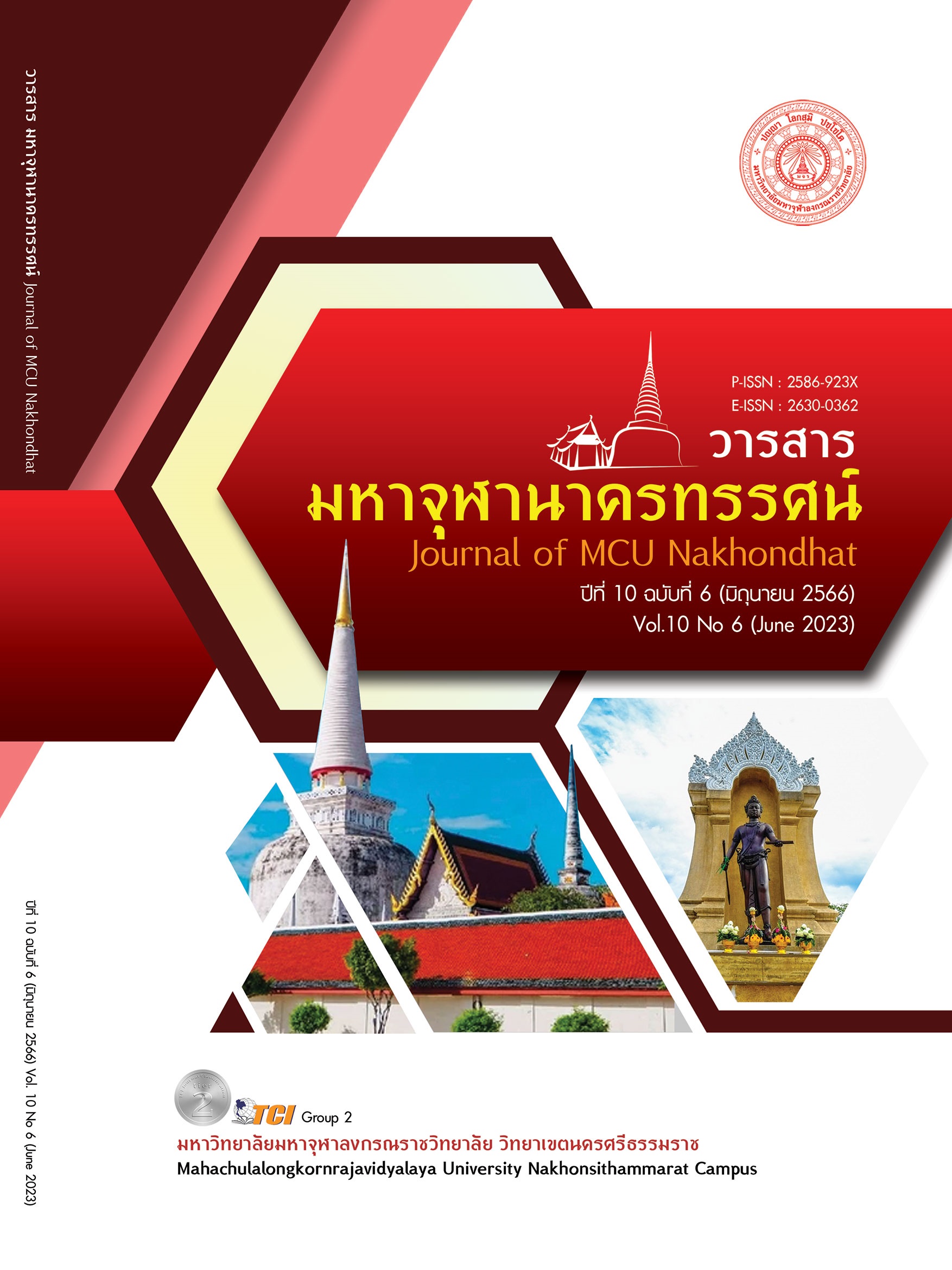EFFECTS OF MODEL-BASED LEARNING DEVELOPMENT ON THE SCIENTIFIC CONCEPTS AND SCIENTIFIC REASONING OF GRADE 7 STUDENTS
Main Article Content
Abstract
This research aimed 1) to develop a model-based learning management plan to be effective according to the 75/75 criteria, 2) to compare the learning achievement of students who received model-based learning management on work and energy with the 70% criteria, 3) To compare the understanding of scientific concepts between pre-learning and post-learning with a model-based learning management on work and energy 4) to compare scientific reasoning between pre-learning and post-learning with a model-based learning management on work and energy. The sample used in this research were Mathayomsuksa 2/7 students studying in the second semester of the academic year 2021 at Sarakham Pittayakhom School, Maha Sarakham Province;40 students were obtained by random cluster sampling. The research instruments were 1) Six model-based learning management plan on work and energy for grade 8th students, 2) The academic achievement tests with a value of reliability (r) was 0.81, 3) a scientific concepts test with a value of reliability (α) was 0.72, and 4) scientific reasoning tests with a value of reliability (α) was 0.82. The statistics used in the data analysis were percentage, average, Standard Deviation, and t-test for one and two dependent samples. the results of the research were the model-based learning management plan effective was 76.98/75.33. the students’ learning achievement scores after learning through model-based learning were statistically significantly higher than the 70% criteria at the .05 level. the students’ understanding on scientific concepts after learning through model-based learning were statistically significantly higher than before at the .05 level. the students’ understanding on scientific reasoning after learning through model-based learning were statistically significantly higher than before at the .05 level.
Article Details

This work is licensed under a Creative Commons Attribution-NonCommercial-NoDerivatives 4.0 International License.
References
กระทรวงศึกษาธิการ. (2560). มาตรฐานการเรียนรู้และตัวชี้วัด กลุ่มสาระการเรียนรู้คณิตศาสตร์ วิทยาศาสตร์ และสาระภูมิศาสตร์ ในกลุ่มสาระการเรียนรู้สังคมศึกษา ศาสนา และวัฒนธรรม (ฉบับปรับปรุง พ.ศ. 2560) ตามหลักสูตรแกนกลางการศึกษาขั้นพื้นฐาน พุทธศักราช . กรุงเทพมหานคร: ชุมนุมสหกรณ์การเกษตร.
งานวัดผลประเมินผล กลุ่มบริหารวิชาการ. (2562). รายงานผลการทดสอบทางการศึกษาระดับชาติขั้นพื้นฐาน (O-NET) ปการศึกษา 2562. มหาสารคาม: โรงเรียนสารคามพิทยาคม.
ธนาศวรรย์ สมไพบูลย์. (2562). การศึกษาความเข้าใจมโนมติทางวิทยาศาสตร์ เรื่อง ปฏิกิริยาเคมีของนักเรียนชั้นมัธยมศึกษาปีที่ 2 ที่ได้รับการจัดการเรียนรู้ด้วยรูปแบบแบบจำลองเป็นฐาน. ใน วิทยานิพนธ์ครุศาสตรมหาบัณฑิต สาขาวิทยาศาสตรศึกษา. มหาวิทยาลัยราชภัฏ.
ฝนทิพย์ ธนชัยสิทธิกุล. (2559). ผลการจัดการเรียนรู้โดยใช้แบบจำลองเป็นฐานต่อความสามารถ ในการให้เหตุผลเชิงวิทยาศาสตร์ของนักเรียนชั้นมัธยมศึกษาตอนต้น. ใน วิทยานิพนธ์การศึกษามหาบัณฑิต สาขาวิชาวิทยาศาสตร์ศึกษา. มหาวิทยาลัยนเรศวร.
รัตนาพร ประพันธ์วิทย์. (2559). ผลการจัดกิจกรรมการเรียนรู้เรื่อง ระบบย่อยอาหาร โดยใช้ Model Centerod instruction Sequence (MCIS) ที่มีต่อมโนมติและการให้เหตุผลเชิงวิทยาศาสตร์ ของนักเรียนชั้นมัธยมศึกษาปีที่ 4. ใน ปริญญาการศึกษามหาบัณฑิต สาขาวิชาชีววิทยา. มหาวิทยาลัยนเรศวร.
ลัทธวรรณ ศรีวิคำ. (2558). ผลของการจัดการเรียนรู้โดยใช้แบบจำลองเป็นฐานที่มีต่อมโนมติ เรื่อง ปฏิสัมพันธ์ในระบบสุริยะ ของนักเรียนชั้นมัธยมศึกษาปีที่3. ใน วิทยานิพนธ์การศึกษามหาบัณฑิต สาขาวิชาวิทยาศาสตร์ศึกษา. มหาวิทยาลัยนเรศวร.
สถาบันส่งเสริมการสอนวิทยาศาสตร์และเทคโนโลยี. (2554). กรอบโครงสร้างการประเมินผลนักเรียนนานาชาติ PISA 2009. กรุงเทพมหานคร : ห้างหุ้นส่วนจํากัด อรุณการพิมพ์.
Gilbert, J. K., et al. (2000). Positioning Models in Science Education and in Design and Technology Education. In J. K. Gilbert & C. J. Boulter (Eds.), Developing Models in Science . Netherlands: Kluwer Academic Publishers.
Gilbert, J.K. and S.W. Ireton. (2003). Understanding models in earth and space science. Arlington: NSTA Press.
Justi, R. S. and Gilbert, J. K. (2003). Teachers' view on the nature of models. International Journal of Science Education, 25(11), 1369-1386.
Ornek, F. (2006). Modeling-Based interactive engagement in an introductory physics course: Students' conceptions and problem solving ability. In Doctoral dissertation Ph.D. University of Purdue, USA.


